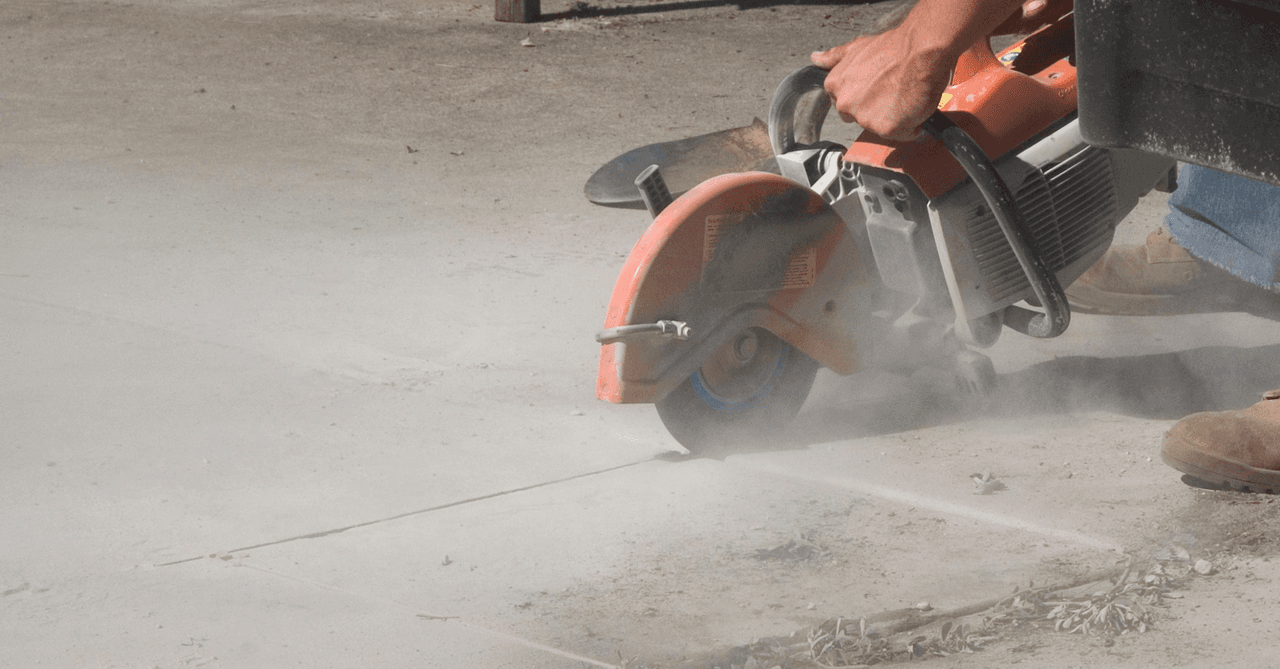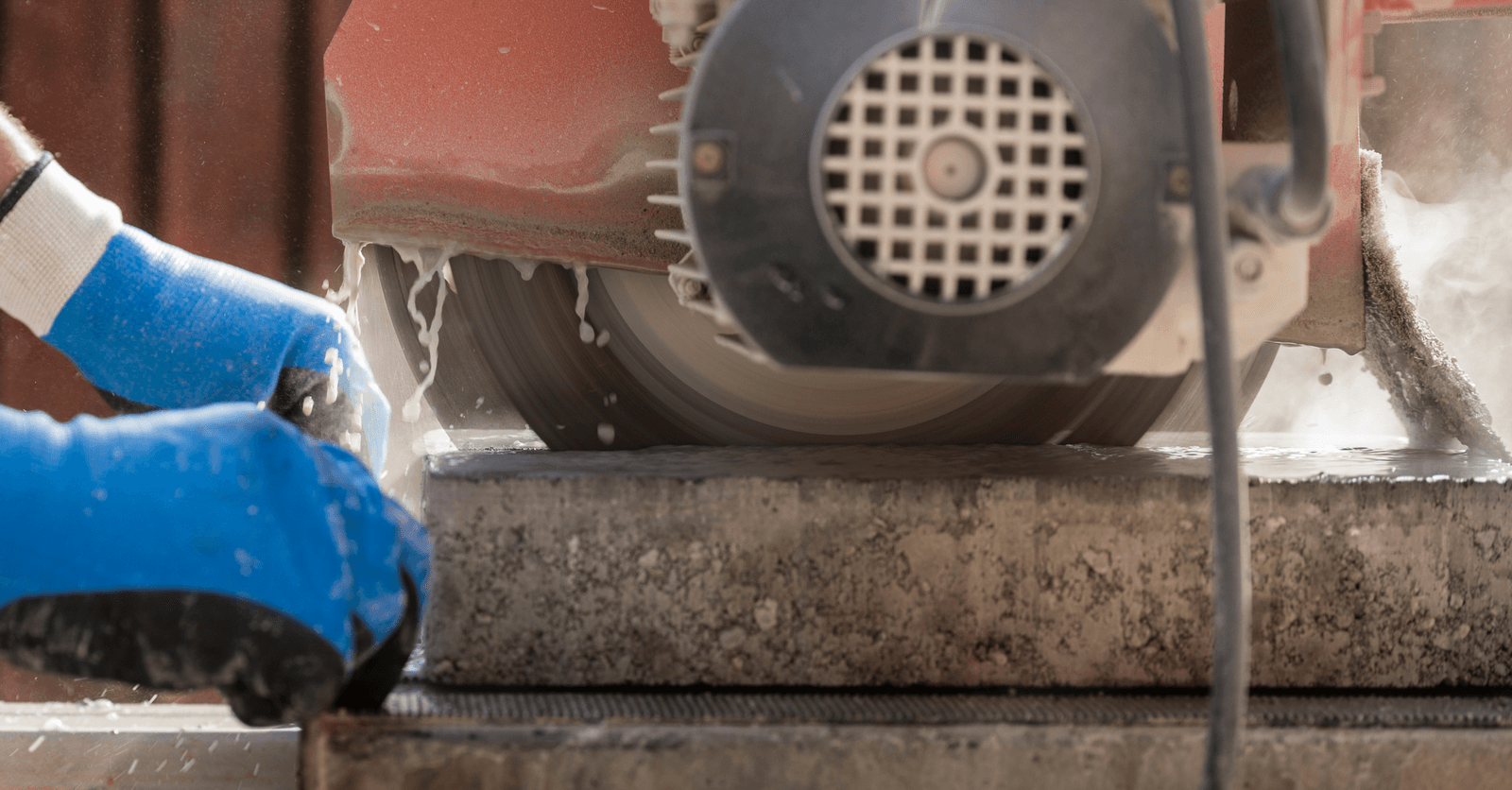Efficient and Precise Cuts with a Concrete Circular Saw
By Editorial Team
Updated on November 8, 2023

A concrete circular saw is an efficient and precise tool provided you’re using the right equipment. From the saw to the blade type, here’s how to choose your material to cut concrete like a pro.
Why Use a Circular Saw to Cut Concrete?

Source: Canva
That’s easy because it’s lightweight and easy to handle. A circular saw can slice concrete slabs over a depth of 6.49 inches (165 mm).
To do so, such a concrete saw must be fitted with a diamond blade, the sole mineral rated 10 on the Mohs Hardness Scale, which true to its name, characterizes the hardness of minerals. As such, it’s solid enough to cut concrete at great depths.
However, there’s another type of blade, one made with a mineral rated 9 on the Mohs Hardness Scale: corundum.
Albeit not as hard as diamond, corundum is a hard aluminum oxide. Sold under the name of “abrasive disc,” it’s cheaper and less durable, and its cuts aren’t as precise nor as fast to carry out.
To that, it can also be said that the cuts aren’t as deep, since they only hit depths of ¼ to ½ inch.
How to Spot a Concrete Circular Saw

Source: Canva
A concrete circular saw blade is easily recognizable. Unlike a miter saw, which has hard-toothed edges, a concrete circular saw is either smooth or segmented. Entry-level blade models are 7 inches wide and cost a little under $8.
A concrete circular saw is often paired with a water line to constantly cool down the blade during its use. If this isn’t the case, you can cool down the zone with the help of a garden hose.
What Type of Saw Should Be Used to Cut Concrete?

Source: Canva
Wet Saw
As we’ve already mentioned, concrete circular saws are often paired with a water line to cool down the blade, which means that there’s also a way to dry-cut concrete, as is the case with the power tool we’ll discuss next.
The advantages of a wet saw hinge on the following:
Expert cut
Speed
Dustless
The device can be equipped with a water reservoir or directly supplied by a garden hose via a connection meant for that very purpose.
Power Saw
A corded concrete chainsaw is ideal when working in a closed-off environment. In fact, using said tool allows one to bypass diesel exhaust generated by a thermal circular saw.
Typically, the dry concrete cutting method is used with this type of device. However, some manufacturers retail circular power saws that are also fitted with a water cooling system.
The blade can measure up to 16 inches wide, with 3,200 W of power, much like thermal cutting tools.
Which Blade Is Best Used to Cut a Concrete Wall?

Source: Canva
Choosing the right blade isn’t as easy as it may seem considering there are differing options available. The blade can be:
Continuous
Segmented
Continuous Blade
A continuous saw blade ensures the best cut for fragile materials, such as flooring and roofing tiles. In fact, it prevents a chisel-like effect that could result in the material cracking.
Segmented Disc
On the other hand, the segmented disc is favoured when working with hard materials like concrete. The segmented blade prevents the disc’s rim from cracking.
As such, to effectively slice concrete, a circular saw fitted with a segmented blade is best.
Choosing the Right Size: 12, 16, or 14 Inches?
As for the width of the blade, it depends on the depth to which the concrete must be cut:
12-inch wide blade: a 4-inch depth (100 mm)
14-inch wide blade: a 5-inch depth (120 mm)
16-inch wide blade: a 6-inch depth (152 mm)
How to Cut a Concrete Slab with a Circular Saw

Source: Canva
Step 1: Measure the width of the slab
The width of the slab is key to determining the size of the blade you’ll need to purchase. In any case, to cut concrete, you’ll need a segmented blade.
Step 2: Choose a type of circular saw
Your device can be:
thermal or powered;
with dry- or wet-cutting.
The tool type very much depends on your needs. For indoor use, it’s best to opt for an electric circular saw to avoid inhaling diesel exhaust generated by the apparatus.
If you’re planning on carrying out numerous fast and precise cuts, a circular saw with a wet cooling system is what you need.
However, if your cuts can be done outside and aren’t as thorough, a dry-cutting method will do. Why, you ask? Because dry-cutting results in a lot more dust and the blade risks overheating faster.
Therefore, this type of cut isn’t meant for indoor spaces or thorough work.
Step 3: Mark cutting guidelines
Using a ruler, string, or chalk, mark the concrete with your cutting guidelines to ensure the saw’s blade hits the intended spot.
Step 4: Set cutting height
While the blade’s diameter is either 12-, 14- or 16-inch wide, you can adjust the saw’s cutting height to your liking. To do so, adjust the knob or lever on your device.
Step 5: Gear up
To cut concrete, not only will you need a circular saw, but you’ll also need the following handy:
Safety goggles
Face shield
Gloves
Mask
Step 6: Cut the concrete
Manually operating a circular saw is pretty straightforward:
place dominant hand on the power trigger;
hold the front grip with other hand.
Holding a circular saw in such a way only serves to hold the power tool firmly in place. Under no circumstances should you push down on the blade when cutting the concrete. The blade’s 3,500 or 4,200 spins/minute will do that.
Step 7: Cool down the blade
If your circular saw is a wet saw, it cools down while cutting. However, nothing’s stopping you from lifting the blade out of the concrete every 30 seconds to help cool it down.
When dry-cutting concrete, the process of cooling down the blade is a must. Otherwise, you risk breaking the blade.
Get 3 quotes for your concrete sawing project
RenoQuotes.com can help you get quotes from a general contractor. By submitting your project, we’ll put you in contact with top-rated contractors. Fill in the form on the homepage (it only takes a few minutes) and get estimates from trusted professionals.
Dial 1-844 828-1588 to speak with one of our customer service representatives.
Looking for something else?
Related articles
The latest industry news, interviews, technologies, and resources.

Editorial Team
•09 May 2024
Did you know that some developed countries recycle up to 90% of their demolition materials? In Quebec, it amounts to 1.85 million tonnes of construction, renovation, and demolition debris, which is subsequently recycled every year. The main recycled materials found in the 50-odd sorting centres scattered about the province are wood, asphalt shingles, and gypsum.

Editorial Team
•14 Mar 2025
Sodium bicarbonate, more commonly referred to as baking soda, is a naturally-derived product that can be used in a million (or 18) different ways around the house. Most of us are used to buying all sorts of household cleaners specially made for different rooms and furniture around the house, but baking soda alone is fit for different household chores. Read on for more!

Editorial Team
•08 Nov 2023
Made with plastic, vinyl first made its way onto the market in the shape of records (the infamous LP) or even as shiny items of clothing. During the 80s, this material became a popular, cushiony flooring option, vinyl sheets, or loose lay vinyl, which was also known as “cushion flooring.”

Editorial Team
•08 Nov 2023
The laundry room is a space that is notorious for being cramped. Since it is a multipurpose room, there is a constant quest to try to keep this room organized and utilitarian while still being an attractive space in the home. Especially in the case of smaller houses and apartments, the laundry room often lacks much-needed storage.

Équipe éditoriale
•08 Nov 2023
Brick is a timeless material, known for its strength and versatility. It can be found in homes with classic architecture as well as in modern and bold-looking buildings. This material has several advantages and if well maintained, will remain beautiful for several years, even decades. When it comes to masonry problems, some are minor and easy to repair. Others are more complex and can cause serious damage if not treated quickly.